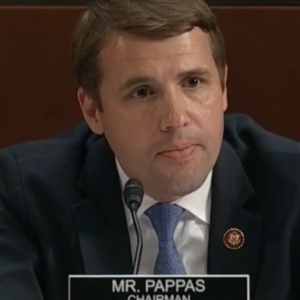When Rep. Chris Pappas was facing what appeared to be a competitive election last year, he told his First District constituents he opposed President Joe Biden’s multi-billion dollar college debt bailout, calling it “no way to make policy.”
But this week, with his reelection in the rear-view mirror, Pappas voted in favor of Biden’s plan to spend approximately half a trillion tax dollars to let college borrowers off the hook. What changed?
Pappas declined to answer requests for comment.
On Wednesday, the U.S. House passed H.J.Res.45, voting 218-203 to repeal the Biden administration’s $525 billion student debt bailout plan, giving those tax dollars to some 40 million federal borrowers. Half of them would have their debt completely eliminated.
The bipartisan resolution would also reverse the administration’s continued freeze on federal student loan payments, a measure that began as pandemic-related relief.
Pappas and his New Hampshire colleague, Rep. Annie Kuster, both voted against repealing Biden’s plan.
Biden’s executive action on student debt is estimated to cost between $300 and $400 billion, transferring up to $20,000 of debt taken on by Pell Grant recipients from the borrower to the taxpayers. Those who weren’t Pell Grant eligible would be off the hook for $10,000 in debt. Households earning up to $250,000 would be eligible.
Biden’s plan has been on hold since November 2022 after a federal judge in Texas ruled it illegal. The U.S. Supreme Court is also expected to rule on Biden’s student debt cancellation plan this term, as the justices heard a pair of arguments challenging the plan in February.
Two Democratic members of Congress, Reps. Jared Golden (D-Me.) and Marie Gluesenkamp Perez (D-Wash.) voted with Republicans to repeal Biden’s plan.
Pappas’ reversal on college debt bailouts is a major shift. When the plan was unveiled in August 2022, Pappas was one of its biggest critics in the Democratic Party. “This announcement by President Biden is no way to make policy and sidesteps Congress and our oversight and fiscal responsibilities,” he said at the time. “Any plan to address student debt should go through the legislative process, and it should be more targeted and paid for so it doesn’t add to the deficit.”
He continued, “The president’s plan also doesn’t address the underlying issue of the affordability of higher education, and it is clear that the high cost continues to limit opportunities available to students. Ultimately we must ensure everyone has the chance to further their education and gain the knowledge and skills they need to thrive.”
So what happened? Pappas’s original comments came just over two months before the 2022 midterm elections, in which he was seen as a vulnerable member of Congress facing reelection in a very competitive district.
Plus, Biden’s approval rating in the Granite State at the time was 43 percent, and Granite Staters were divided on the student loan bailout itself, with 49 percent opposed and 45 percent in support, according to the UNH Survey Center.
But with the 2022 midterms long over–an election he won by eight points–Pappas is back in line with Biden. In fact, since January, both Pappas and Kuster have voted with the president 100 percent of the time, according to FiveThirtyEight’s Biden scores.
Pappas’s office declined to comment about his apparent switch. The rest of the New Hampshire congressional delegation chose not to comment on the resolution as well.
Opponents of the bailout say it is unfair to force taxpayers who never attended college or who paid off their student loans to subsidize college grads and affluent suburbanites. Republicans were outraged Wednesday when a Democratic member of Congress, Rep. Maxwell Frost (D-Fla.), compared students who borrowed money to pay for college to victims of Jim Crow racism.
“If we legislated using the logic that you bring to this issue here today, women and Black folks wouldn’t have the right to vote because it would be unfair to those who never got to vote before them,” Frost said.
“Why do you bring that bigoted logic to this issue as it relates to students but not any other issue?” he added.
When Republicans objected, noting that people who took out federal loans chose to do so, as opposed to people who were born Black or female, Frost retracted his statement.
The controversy didn’t end there, however.
Karine Jean-Pierre, Biden’s press secretary, repeated arguments made by many debt bailout supporters comparing the borrowing to Paycheck Protection Program (PPP) loans given to employers during the COVID-19 pandemic.
Critics of that comparison have pointed out the PPP was implemented to address a government-ordered lockdown as local and state governments, following federal public health guidelines, mandated the closure of “non-essential” businesses during the pandemic. The PPP was also passed Congress through the legislative process, while the student debt plan was the product of Biden’s unilateral executive action.
Pierre stated the president “will veto this bill” if the joint resolution reaches his desk.
To get there, the resolution has to get through the U.S. Senate. The Congressional Review Act, under which the resolution was presented, allows Republicans to avoid the usual 60 votes required for a filibuster and force a vote on the measure. That means the Senate’s resolution, S.J.Res.22, requires a simple majority to pass.
To achieve that majority, Republicans must convince at least two Democratic senators to vote against Biden. Moderate Sens. Joe Manchin (D-W.V.), Jon Tester (D-Mont.), and Catherine Cortez Masto (D-Nev.) have voiced concerns about canceling such a large sum of debt, but none have indicated whether they will vote to repeal Biden’s plan.
Both of New Hampshire’s Democratic senators, Jeanne Shaheen and Maggie Hassan, are expected to back the billion-dollar bailout and vote against repeal. Shaheen has voted with Biden 98.4 percent of the time, while Hassan’s Biden score is 97 percent.





